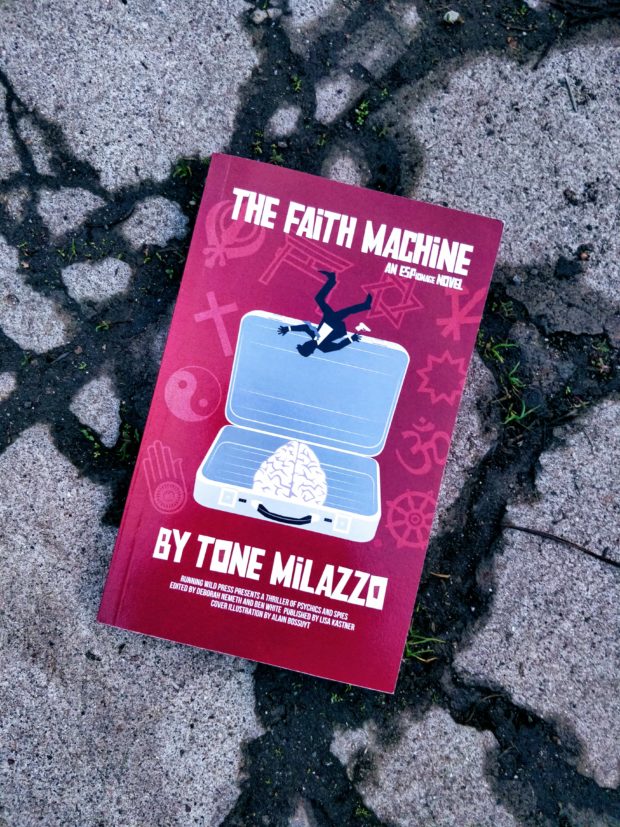
Review Fix chats with “The Faith Machine†author Tone Milazzo, who shares the creative process behind his new book, “The Faith Machine.â€
Learn more about Milazzo on GoodReads.

Review Fix: What inspired the creation of this book?
Tone Milazzo: A combination of a lifetime spent reading superhero comics, and Jon Ronson’s non-fiction book, The Men Who Stare At Goats about Cold War psychic warfare programs.
I grew up in the post-Watchmen era where every writer was trying to answer the question, “What if superheroes existed in the real world?†Really the question is, “A new power enters the world stage. How do the existing, old powers deal?†That question was answered for me by politics. If they’re not careful, new powers either get squashed or co-opted. Occupy Wall Street was squashed, The Tea Party was co-opted.
If the Goat-Staring Men were capable of remote viewing, and killing farm animals from another room with their mind, then they’re as close to superheroes as we’ve ever seen. And they were under the thumb of the intelligence community. Co-opted.
After letting the idea stew for a couple of months, The Faith Machine emerged as a fusion of spy and superhero tropes. New powers, navigating the old power’s world. Cover identities instead of secret identities. Agencies instead of super teams. Shades of gray instead of black and white.
Review Fix: What did you read as a kid?
Milazzo: Lots of comics, mostly Marvel until ‘86 then DC and indies from then on. I gravitated toward team books, X-Men, Avengers, Justice League, Exiles, etc. That group dynamic which I brought to The Faith Machine.
When it comes to prose, I tended to find an author I liked and stick with them for a dozen books before moving on to the next. C.S. Lewis, then David Brin, Michael Moorcock. It probably had something to do with how the author’s pet themes spoke to me at that time in my life in a way I wasn’t sophisticated enough to understand.
Review Fix: What was the writing process like?
Milazzo: It started with the world building phase. Where did psychic come from? What were their limits? How did they fit in the world? So I read a lot about how the intelligence community works, worldwide. You’ll see that in The Faith Machine. The US has a lot of agencies that don’t always communicate very well, North Korea’s still leveraging what they learned from the Soviets, and China’s got a large bankroll but is playing international catch-up.
I knew I wanted to do an ensemble cast this time, so I had to make sure the characters didn’t overlap in capabilities or personality.
Then the outlining. So much outlining. 77 pages of notes, one page per scene. Spent a lot of time ironing that out, making sure there were fewer plot holes. (Every story has plot holes, but as few as I could manage.) It worked out pretty well. The book I originally envisioned is what made it to the page.
Review Fix: What did you learn through the writing process that you weren’t expecting?
Milazzo: That the CIA are good guys, for the most part. From my research, my takeaway is that the agency is filled with mostly good people trying to do what’s right. But they’re under the orders of some bad administrations. They should be left to do their job; collecting information from abroad. Instead, they get sent out to overthrow governments and such. It’s unfortunate they also take all the heat for these actions.
Review Fix: What are your goals for the book?

Milazzo: To build out the ESPionage property across all media. I’ve already finished the first draft of a role-playing game, based on the Fate Core engine. And I’m working on a sequel novel, The Bliss Gun. I’d love to get a comic or two in the works, but good art doesn’t come cheep, so I still have to build the ESPionage brand (and my brand) up to the point where a Kickstarter is feasible.
Anything that happens beyond that would be nice, but also out of my hands.
Review Fix: How would you like it to be remembered?
Milazzo: A quirky series that lives in the wake of this era of Marvel movies. A post-superhero story, like Grant Morrison’s Invisibles but for the 21st century.
Review Fix: What’s next?
Milazzo: I was about a quarter of the way through with the first draft of the sequel when this COVID-19 pandemic started. Now I’m not sure what to do. Do I set the follow up before the pandemic, or try to imagine what life will be like after this is over?
I’m also working on a few comic book pitches. The furthest along is The Jade Queen, an occult thriller inspired by The Maltese Falcon. Trying to build a comics portfolio for the aforementioned Kickstarter.
Review Fix: Anything else you’d like to add?
Milazzo: They hardest part of writing is getting anyone to take notice. I really appreciate opportunities sites like Review Fix provide for creators.


Leave a Reply